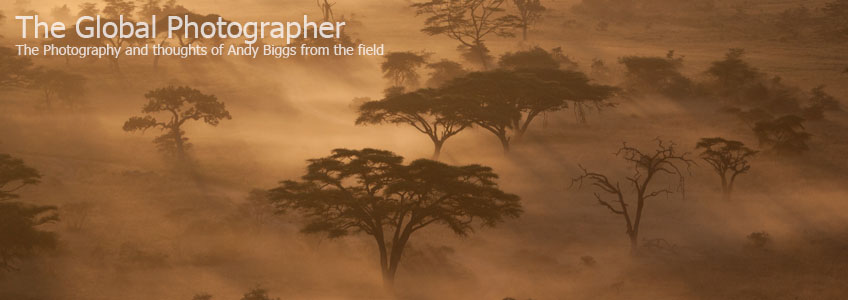Tswalu Kalahari - My Experiences
 Tuesday, December 28, 2010 at 03:16PM
Tuesday, December 28, 2010 at 03:16PM At the end of my 2010 Predators of the Sabi Sands safari, I took some time to go and visit a property that I have wanted to visit for quite some time. The property is called Tswalu Kalahari, and is in the Kalahari Desert in the Northern Cape of South Africa. Tswalu is a very large reserve, made up of more than 106,000 hectares, with excellent wildlife for the wildlife photographer and nature lover. Tswalu’s habitat and wildlife are quite amazing: a semi-arid environment of red earth and sand dunes, wide open skies, 230+ species of birds, 90 species of mammals and some of the most breathtaking scenery as a backdrop. Let’s go over some of the mammal species: sable antelope, roan antelope, giraffe, black rhino, Kalahari desert lion (awesome manes!), meerkat, brown hyaena, aardwolf, aardvark, ground squirrel, and tons more to keep one’s attention.
Background and Accommodations
The name Kalahari derives from the Tswana word “Kgala” which means “great thirst”. But the southern Kalahari, where Tswalu is located, is really a “green desert” as the Korannaberg Mountains attract precious rainfall in the summer months. The Kalahari has been the ancestral home of the San people, or Bushmen, for thousands of years. As hunter-gatherers, the Bushmen survived by tracking and hunting wild game with bows and arrow, gathering berries or desert melons and storing scarce water in the blown-out shells of ostrich eggs. The San culture and beliefs are rich and rooted in this land.
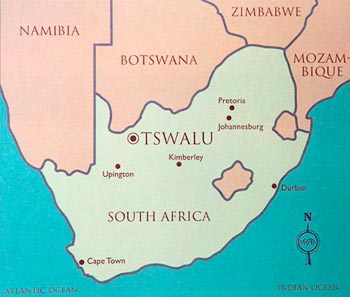
Tswalu is located in the southern area of the Kalahari Desert, on the South African side of the border
Historically the area has been both ranch land and hunting land. In 1999 Nicky Oppenheimer purchased Tswalu, extended the amount of land, and began restoring the land back to its original state. Tswalu has two different accommodation options: The Motse and Tarkuni. The Motse is the main location, which means “village” in Tswana, and consists of just eight spacious and secluded suites. Tarkuni is the Oppenheimer’s private home, and can accommodate up to 10 guests. I stayed at The Motse during my visit, and did take the opportunity to visit Tarkuni during some down time. Both are excellent and very comfortable, and I would love to stay at Tarkuni if I bring a handful of travelers with me, due to the more private setting. Regarding The Motse, 2 of their suites have 2 rooms, and myself and one of my guests used one of these rooms during our stay. The 2-bedroom suites have 2 bathrooms and a common area, and would work well for a small family of 2 to 4 people. It should be said that Tswalu is a member of the Relais & Châteaux collection of worldwide properties, which means you know you will receive excellent service, dining and accommodations. Tswalu has their own private airplane, a Pilatus PC-12, which only takes about 90 minutes of flight time to get to and from Johannesburg, and they also have service in and out of Capetown. There are other planes available, depending on need and availability.
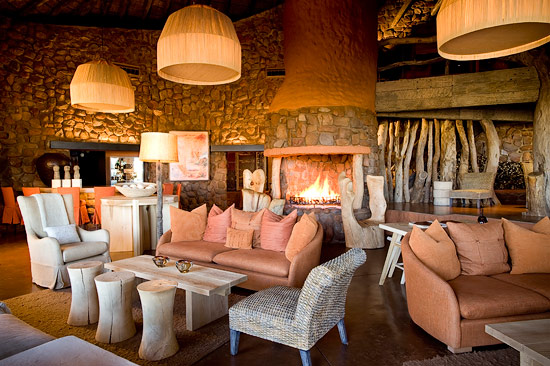
The lounge are at Motse
Wildlife Wildlife Wildlife
Well, I am an African wildlife photographer, and I am driven primarily by photography than anything else. Tswalu’s wildlife is not what I would call a ‘big five’ experience, and is more appropriate for people who have been on safari before or who would like to experience species that are not easily seen in other places. I went to Tswalu to photograph meerkats, desert adapted Kalahari lions, black rhino and sable antelope. I did come away with wonderful images and experiences with all of these species, as well as with some other things that I did not expect. Here are just some wildlife experiences we encountered:
- A crash of 5 white rhinos running a few feet from the side of the vehicle (was difficult to photograph, for sure).
- Mating Kalahari desert adapted lions, and the male had a huge dark mane that is the most magnificent of any male I have ever seen.
- Tracking black rhino and finding both mother and young calf together, only 10 meters from us.
- Numerous visits to meerkat mobs (yes, they are called ‘mobs’ or ‘gangs’) to photograph them from many different angles and lighting situations.
- Numerous sightings of both sable and roan antelope.
- Dozens of bird species, and I especially am fond of all of the weaver species on the reserve.
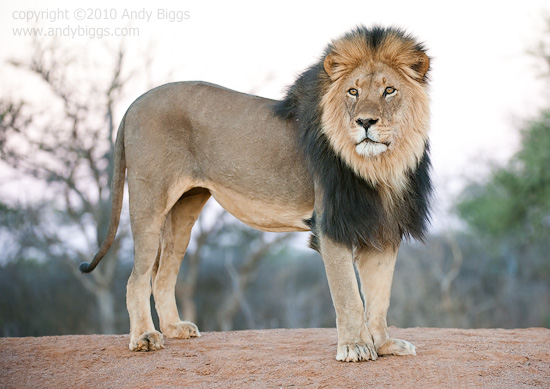
Big Boy, my nickname for one of their magnificent Kalahari desert adapted male lions
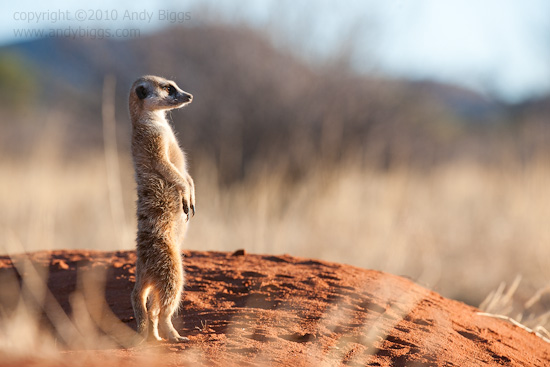
Meerkat sunning himself in the morning light
Additional Information and Wrap-up
I visited in mid November, and based on what I know about the area I should plan on coming back during some of the warm(er) months. I am not sure that I will visit during the wintertime, as would like to have the big, puffy clouds on the horizon to contrast the red sand on the ground, and that needs to happen when the days are warm.
My experience at Tswalu was extraordinary, and one of the best combinations of service, dining, accommodations, wildlife and overall experience that I have ever experienced in Africa. This says quite a bit about how I feel about Tswalu, and how much I desire to return in future years.
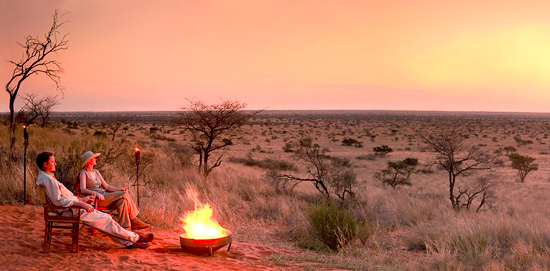
Sunset over the Kalahari Desert, Tswalu
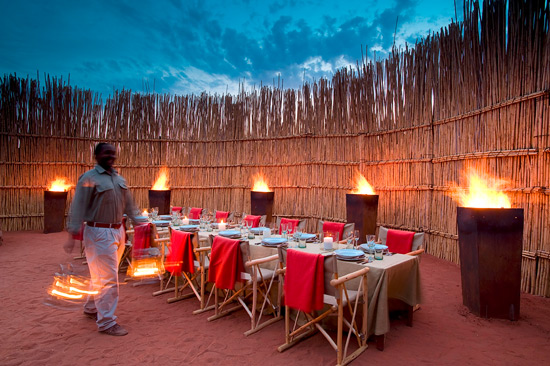
Setting up for dinner-under-the-stars in the Boma
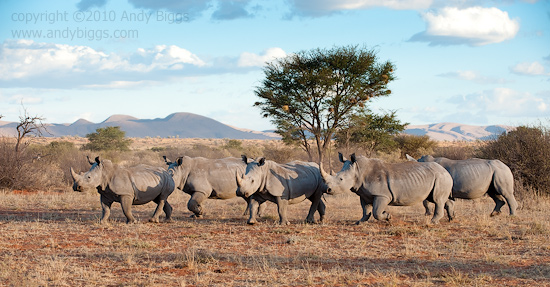
A crash of five white rhinos, who took a few seconds to stop while I took a photograph. We drove next to them for a few minutes, watching them run parallel to our vehicle. What a blast.
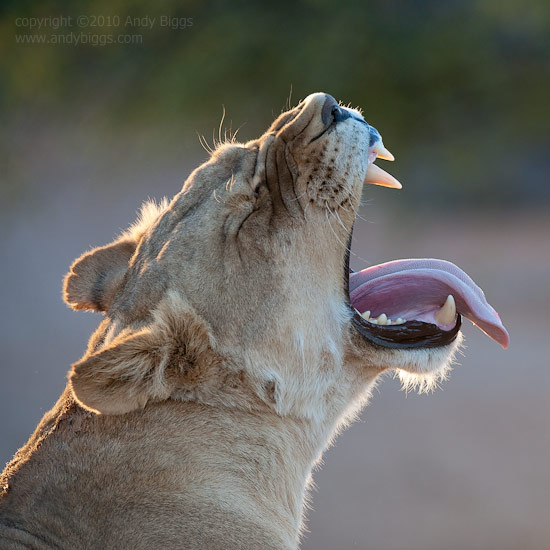
Yawning lioness in the late afternoon light
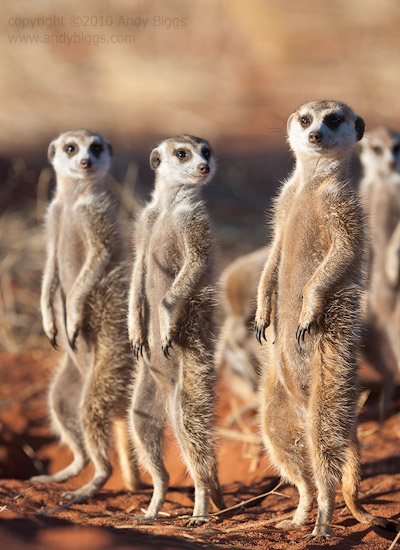
Meerkats, all sunning themselves in the morning light
